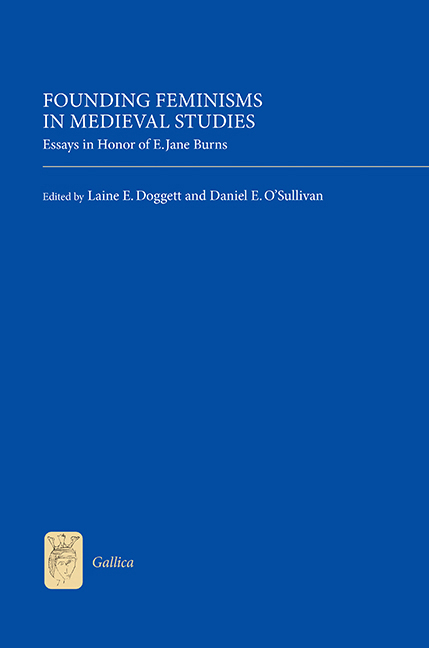Book contents
- Frontmatter
- Contents
- List of Illustrations
- List of Contributors
- Acknowledgements
- Introduction: The Work of E. Jane Burns and the Feminisms of Medieval Studies
- E. Jane Burns: A Bibliography
- Part I Debating Gender
- Natural and Unnatural Woman: Melusine Inside and Out
- Nurturing Debate in Le Roman de Silence
- The Man Backing Down from the Lady in Trobairitz Tensos
- Having Fun with Women: Why a Feminist Teaches Fabliaux
- Part II Sartorial Bodies
- Part III Mapping Margins
- Part IV Female Authority: Networks and Influence
- Afterword: A Response to the Volume
- Index
- Tabula Gratulatoria
- Already Published
Natural and Unnatural Woman: Melusine Inside and Out
from Part I - Debating Gender
Published online by Cambridge University Press: 05 July 2016
- Frontmatter
- Contents
- List of Illustrations
- List of Contributors
- Acknowledgements
- Introduction: The Work of E. Jane Burns and the Feminisms of Medieval Studies
- E. Jane Burns: A Bibliography
- Part I Debating Gender
- Natural and Unnatural Woman: Melusine Inside and Out
- Nurturing Debate in Le Roman de Silence
- The Man Backing Down from the Lady in Trobairitz Tensos
- Having Fun with Women: Why a Feminist Teaches Fabliaux
- Part II Sartorial Bodies
- Part III Mapping Margins
- Part IV Female Authority: Networks and Influence
- Afterword: A Response to the Volume
- Index
- Tabula Gratulatoria
- Already Published
Summary
“You make me feel like a natural woman” Carole King and Gerry Goffin
What is nature, what is woman? Jean d'Arras's fourteenth-century amalgam of romance, history, genealogy, crusade epic, and fairytale reminds us that the definition of nature is a work in progress, changing through time, depending as much on culture's framing optics as on the state of scientific knowledge. And woman's inscription into nature, as suggested by Melusine and multiple traditions of Western culture, is decidedly not the same as man's.
Jean's prologue implies two views of nature that will uncomfortably coexist as his romance unfolds. One is attached to Aristotle's notion of finality: in nature, all things tend toward perfection or fail to reach it because of their “vices” (p. 110) – that is, in Aristotelian terms, deficiencies in their seed that produce the likes of monsters and human twins.
En toutes choses commencier on doit appeller le Createur des creatures qui est maistre de toutes les choses faites et a faire qui doivent tendre a perfection de bien et les autres pervenir selon les vices des creatures.
[In beginning all things, one should call upon the Creator of creatures who is the master of all the things made and to be made that must tend to perfection of being and of the others that reach only as far as their vices allow.]
Mixed with this Aristotelian perspective is Jean's Christian and biblical concept of nature: God has created wonders that surpass human understanding, invisible things about which only Adam before the Fall had perfect knowledge.
La creature de Dieu raisonnable doit entendre, selon que dit Aristote que des choses invisibles … si comme saint Pol le dit … que les choses qu'il a faictes seront veues et sceues par la creature du monde … qui voit les livres lire et adjouste foy es atteurs, entendre les anciens, les provinces, terre et royaumes visiter. L'en treuve tant de merveilles … et si nouvelles que humain entendement est contraint de dire les jugemens de Dieu sont abisme sans fons et sans rive.
- Type
- Chapter
- Information
- Founding Feminisms in Medieval StudiesEssays in Honor of E. Jane Burns, pp. 21 - 32Publisher: Boydell & BrewerPrint publication year: 2016

